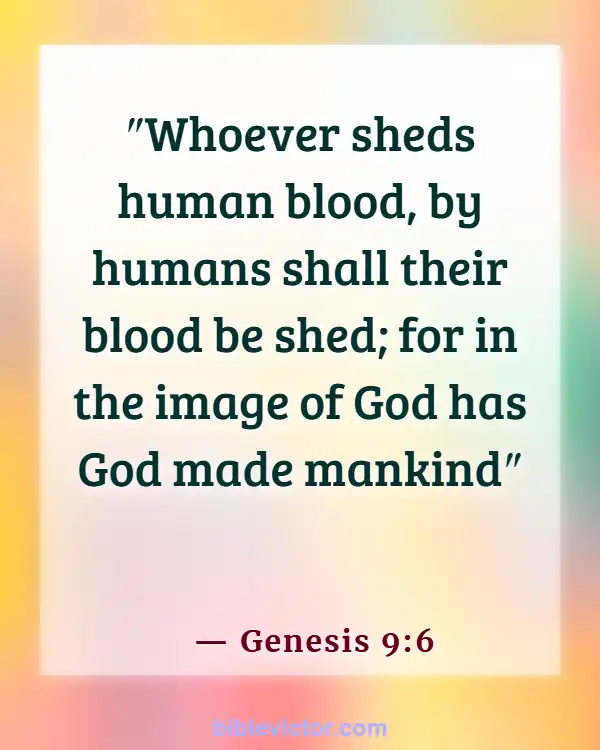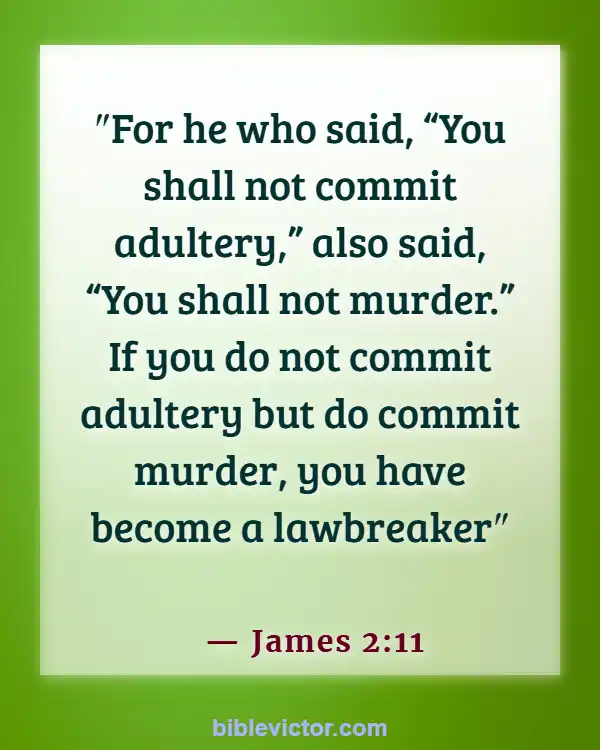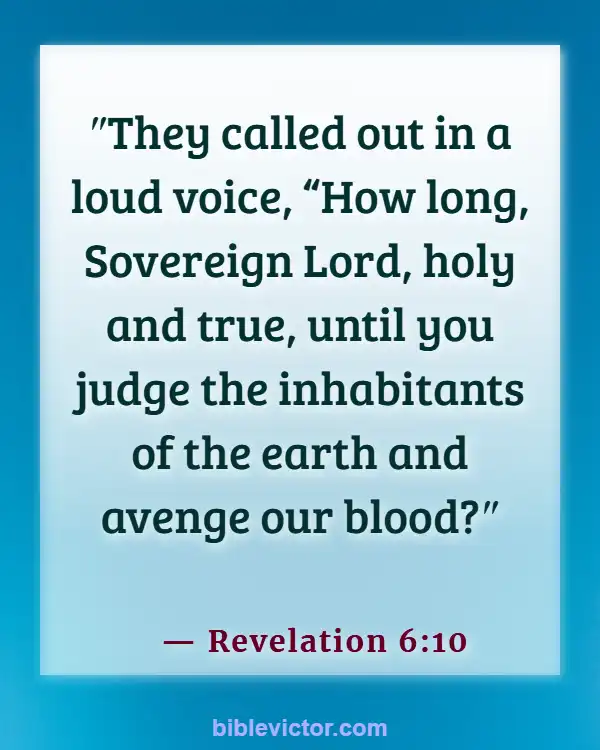Friends, if you’re seeking “Bible verses About Punishment For Murder,” this content is for you. Today, I share Bible verses that will help you better understand the biblical perspective on the consequences of taking a life. These scriptures offer insight into God’s view on murder and the prescribed punishments. They highlight the sanctity of human life and the gravity of this act in God’s eyes. Let’s explore what the Bible says about the punishment for murder, providing clarity on this serious topic.
Contents
- 1 What Does the Bible Say About the Consequences of Murder?
- 2 Old Testament Verses on Punishment for Murder
- 3 New Testament Perspectives on Murder and Judgment
- 4 Is Capital Punishment Biblical for Murder Cases?
- 5 Forgiveness and Redemption for Murderers in Scripture
- 6 How Does God View Justice for Murder Victims?
What Does the Bible Say About the Consequences of Murder?
Understanding the Bible’s stance on the consequences of murder requires us to delve into its teachings about justice, responsibility, and morality. The scriptures show us that God values life immensely and holds individuals accountable for taking another’s life. Yet, even in these stern warnings, there is a thread of hope and redemption. Let’s look at what the Bible says about these serious consequences.
Genesis 9:6 – Life for life principle

“Whoever sheds human blood,
by humans shall their blood be shed;
for in the image of God
has God made mankindGenesis 9:6
Genesis 9:6 underscores the gravity of taking a life, emphasizing that murder warrants severe consequences. It introduces the “life for life” principle, highlighting the sanctity of human life and the divine mandate for justice.
Exodus 21:12 – Death penalty for murder
“Anyone who strikes a person with a fatal blow is to be put to death
Exodus 21:12
Exodus 21:12 establishes the principle of capital punishment for murder, underscoring the gravity of taking a life. It reflects the biblical view that justice requires severe consequences for the intentional act of murder.
Leviticus 24:17 – Death penalty for murder

“‘Anyone who takes the life of a human being is to be put to death
Leviticus 24:17
Leviticus 24:17 emphasizes the seriousness of taking a life, stating that anyone who commits murder is subject to the death penalty. This reflects the biblical principle of justice and the sanctity of human life.
Matthew 26:52 – Live by sword, die by sword

“Put your sword back in its place,” Jesus said to him, “for all who draw the sword will die by the sword
Matthew 26:52
Matthew 26:52 highlights the principle of retribution, suggesting that those who resort to violence, like murder, will themselves face violent consequences. It underscores the Biblical teaching that living by violence leads to destruction.
Revelation 21:8 – Lake of fire for murderers

But the cowardly, the unbelieving, the vile, the murderers, the sexually immoral, those who practice magic arts, the idolaters all liars—they will be consigned to the fiery lake of burning sulfur. This is the second death.”
Revelation 21:8
Revelation 21:8 warns that murderers, along with others who commit grave sins, face eternal punishment in the lake of fire, underscoring the severe consequences of taking a life and rejecting God’s righteousness.
Old Testament Verses on Punishment for Murder
The Old Testament provides direct and sometimes severe guidelines on how societies should handle the crime of murder. These ancient texts emphasize justice and the sanctity of life, often prescribing measures that were meant to deter future violence. As we explore these scriptures, consider how they reflect God’s call for justice and order among His people.
Exodus 20:13 – Do not murder
“You shall not murder
Exodus 20:13
Exodus 20:13 succinctly commands, “Do not murder,” highlighting the sanctity of human life. This foundational principle in the Old Testament underscores the moral and legal prohibition against taking another’s life, emphasizing accountability and divine justice for such actions.
Numbers 35:16 – Murder with weapon, death penalty
“‘If anyone strikes someone a fatal blow with an iron object, that person is a murderer; the murderer is to be put to death
Numbers 35:16
Numbers 35:16 emphasizes the gravity of murder committed with a weapon, prescribing the death penalty as a just punishment. This Old Testament verse underscores the seriousness of intentional killing and the corresponding divine mandate for justice.
Deuteronomy 19:11 – Intentional murder requires punishment
But if out of hate someone lies in wait, assaults kills a neighbor, then flees to one of these cities
Deuteronomy 19:11
Deuteronomy 19:11 emphasizes that intentional murder demands justice. In the Old Testament context, it underscores the seriousness of taking a life intentionally and the necessity for appropriate punishment to uphold justice and moral order.
Leviticus 24:21 – Life for life, injury for injury
Whoever kills an animal must make restitution, but whoever kills a human being is to be put to death
Leviticus 24:21
Leviticus 24:21 emphasizes the principle of retributive justice in the Old Testament, mandating equal punishment, “life for life, injury for injury,” to uphold justice and order within the community by deterring acts of violence.
New Testament Perspectives on Murder and Judgment
The New Testament shifts the focus slightly, emphasizing heart transformation and the spiritual dimensions of murder. Jesus and the apostles teach that harboring hatred can be as damaging as the act itself. Through these teachings, we are reminded of the importance of inner purity and the broader implications of our thoughts and actions. Let’s see these perspectives.
Matthew 5:21-22 – Inner anger equals murder judgment
“You have heard that it was said to the people long ago, ‘You shall not murder, anyone who murders will be subject to judgment.’ But I tell you that anyone who is angry with a brother or sister will be subject to judgment. Again, anyone who says to a brother or sister, ‘Raca,’ is answerable to the court. anyone who says, ‘You fool!’ will be in danger of the fire of hell
Matthew 5:21-22
In Matthew 5:21-22, Jesus deepens the understanding of the commandment against murder, equating inner anger with the act itself, thus expanding the scope of judgment to include not just actions, but intentions and emotions.
Romans 13:4 – Authority as God’s servant for justice

For the one in authority is God’s servant for your good. But if you do wrong, be afraid, for rulers do not bear the sword for no reason. They are God’s servants, agents of wrath to bring punishment on the wrongdoer
Romans 13:4
Romans 13:4 emphasizes that governing authorities act as God’s servants, wielding the power to execute justice, including punishment for murder. This verse highlights the divine mandate for authorities to uphold order and righteousness.
1 John 3:15 – Hatred equates to murder’s guilt
Anyone who hates a brother or sister is a murderer, you know that no murderer has eternal life residing in him
1 John 3:15
1 John 3:15 emphasizes that harboring hatred is akin to committing murder in the heart, reflecting New Testament teachings on inner intentions. It highlights how deep-seated animosity incurs moral guilt equivalent to that of physical acts.
James 2:11 – Breaking one law breaks all

For he who said, “You shall not commit adultery,” also said, “You shall not murder.” If you do not commit adultery but do commit murder, you have become a lawbreaker
James 2:11
James 2:11 emphasizes that breaking one part of the law is akin to breaking the entire law, highlighting the seriousness of all transgressions, including murder, and underscoring the need for consistent adherence to God’s commandments.
Is Capital Punishment Biblical for Murder Cases?
The question of capital punishment is complex, and the Bible offers various viewpoints. While the Old Testament contains instances where capital punishment is prescribed, the New Testament encourages mercy and redemption. This tension invites us to consider the balance between justice and grace. Explore these passages to see how they inform this ongoing debate.
Exodus 21:14 – Intentional murder, no sanctuary
But if anyone schemes kills someone deliberately, that person is to be taken from my altar put to death
Exodus 21:14
Exodus 21:14 emphasizes that intentional murder is a grave offense for which no sanctuary is provided. It underscores the principle of justice, supporting the notion that capital punishment is appropriate for premeditated murder cases.
Acts 25:11 – Appeal to Caesar for justice
If, however, I am guilty of doing anything deserving death, I do not refuse to die. But if the charges brought against me by these Jews are not true, no one has the right to hand me over to them. I appeal to Caesar!”
Acts 25:11
Acts 25:11 highlights Paul’s appeal to Caesar as a pursuit of justice, raising questions about capital punishment’s role in murder cases. It underscores the biblical contemplation of legal systems and justice, including life-and-death decisions.
Forgiveness and Redemption for Murderers in Scripture
The Bible is rich with stories of redemption, showing that even those who have committed grave sins, like murder, can find forgiveness through repentance. These stories are a testament to God’s boundless mercy and grace. They remind us that no one is beyond the reach of God’s transformative love. Let’s delve into these powerful messages of hope and renewal.
2 Samuel 12:13 – David’s sin confessed, forgiven

Then David said to Nathan, “I have sinned against the Lord .”Nathan replied, “The Lord has taken away your sin. You are not going to die
2 Samuel 12:13
In 2 Samuel 12:13, David acknowledges his sin of murder and adultery, confessing to Nathan. Despite the gravity of his actions, God forgives him, highlighting the themes of repentance, divine mercy, and redemption even for grave sins.
Psalm 51:14 – Deliverance from bloodguilt and praise
Deliver me from the guilt of bloodshed, O God,
you who are God my Savior,
my tongue will sing of your righteousnessPsalm 51:14
Psalm 51:14 highlights the plea for deliverance from the guilt of murder, emphasizing God’s forgiveness and redemption. It underscores the transformative power of divine mercy, allowing the forgiven to proclaim God’s righteousness and praise.
1 John 1:9 – Confession brings forgiveness and cleansing
If we confess our sins, he is faithful just will forgive us our sins purify us from all unrighteousness
1 John 1:9
1 John 1:9 emphasizes that through confessing our sins, including grave ones like murder, God offers forgiveness and cleansing. This verse highlights the transformative power of repentance, underscoring the possibility of redemption for even the gravest sins.
Acts 9:13-15 – Chosen instrument for God’s purpose
“Lord,” Ananias answered, “I have heard many reports about this man all the harm he has done to your holy people in Jerusalem. he has come here with authority from the chief priests to arrest all who call on your name.”But the Lord said to Ananias, “Go! This man is my chosen instrument to proclaim my name to the Gentiles their kings to the people of Israel
Acts 9:13-15
Acts 9:13-15 highlights God’s transformative power and grace, showing that even persecutors like Saul (later Paul) can become chosen instruments for His divine purpose, emphasizing forgiveness and redemption available to all, including murderers.
Luke 23:34 – Forgiveness for those who harm

Jesus said, “Father, forgive them, for they do not know what they are doing.” they divided up his clothes by casting lots
Luke 23:34
Luke 23:34 highlights Jesus’ profound forgiveness, even towards those who harm or murder. It underscores the possibility of redemption for all, emphasizing mercy and grace as pivotal themes in the face of wrongdoing.
How Does God View Justice for Murder Victims?
The Bible assures us that God is deeply concerned with justice for victims. His heart is for restoration and righteousness, and He promises that He will ultimately right every wrong. These scriptures encourage us to trust in God’s perfect justice and to seek His guidance in advocating for those who have been wronged. Let’s consider these comforting assurances.
Psalm 9:12 – God remembers the afflicted
For he who avenges blood remembers;
he does not ignore the cries of the afflictedPsalm 9:12
Psalm 9:12 emphasizes God’s justice and compassion, assuring that He does not forget the cries of murder victims. It highlights that God stands with the afflicted and holds perpetrators accountable, underscoring His commitment to justice.
Isaiah 61:8 – God loves justice, hates robbery
“For I, the Lord , love justice;
I hate robbery wrongdoing.
In my faithfulness I will reward my people
make an everlasting covenant with themIsaiah 61:8
Isaiah 61:8 highlights God’s commitment to justice and His disdain for wrongdoing. It underscores that God values fairness and righteousness, ensuring that justice is served, particularly in cases of severe transgressions like murder.
Romans 12:19 – Vengeance belongs to God

Do not take revenge, my dear friends, but leave room for God’s wrath, for it is written: “It is mine to avenge; I will repay,” says the Lord
Romans 12:19
Romans 12:19 emphasizes that vengeance is God’s responsibility, not ours. It assures us that God sees and will address the injustice of murder, reminding us to trust in His perfect justice and refrain from seeking personal revenge.
Revelation 6:10 – Cry for justice from martyrs

They called out in a loud voice, “How long, Sovereign Lord, holy true, until you judge the inhabitants of the earth avenge our blood?”
Revelation 6:10
Revelation 6:10 portrays the souls of martyrs crying out for divine justice, emphasizing God’s awareness of their suffering and His promise to address the injustice of murder, affirming His commitment to ultimate justice.


